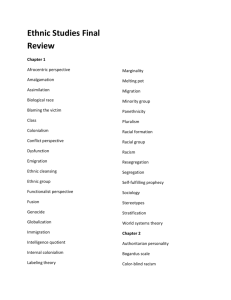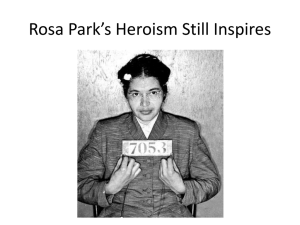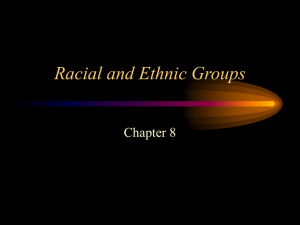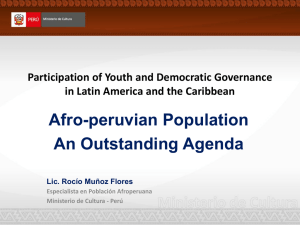CERD Advance Unedited Version Concluding observations on the combined nineteenth to
advertisement
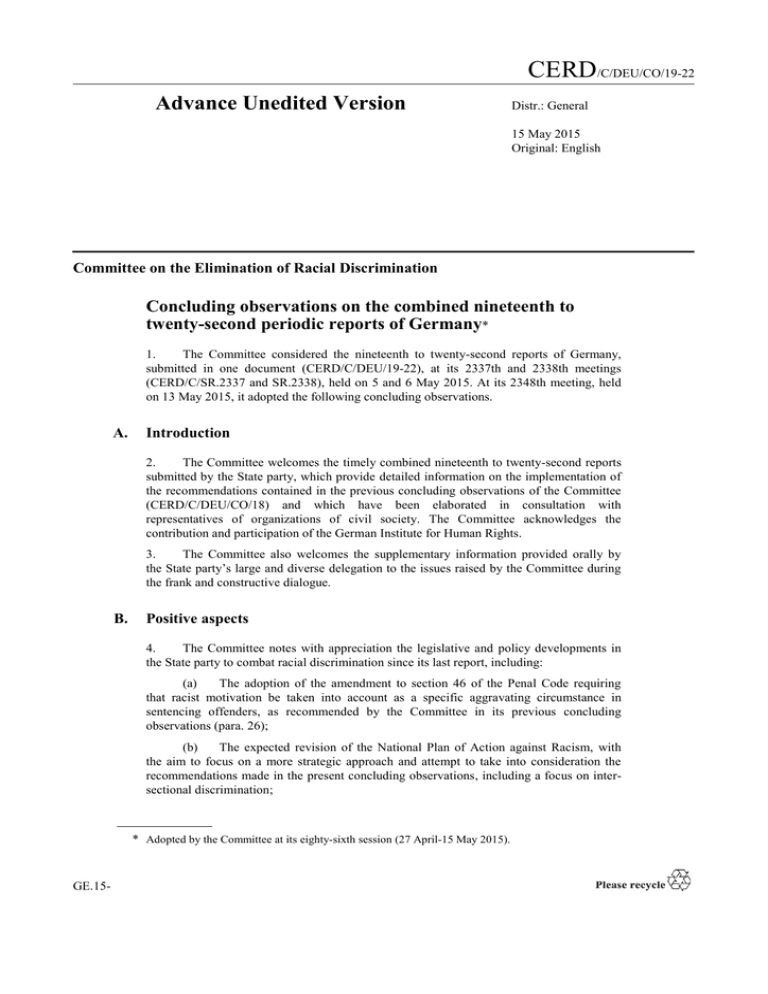
CERD/C/DEU/CO/19-22 Advance Unedited Version Distr.: General 15 May 2015 Original: English Committee on the Elimination of Racial Discrimination Concluding observations on the combined nineteenth to twenty-second periodic reports of Germany* 1. The Committee considered the nineteenth to twenty-second reports of Germany, submitted in one document (CERD/C/DEU/19-22), at its 2337th and 2338th meetings (CERD/C/SR.2337 and SR.2338), held on 5 and 6 May 2015. At its 2348th meeting, held on 13 May 2015, it adopted the following concluding observations. A. Introduction 2. The Committee welcomes the timely combined nineteenth to twenty-second reports submitted by the State party, which provide detailed information on the implementation of the recommendations contained in the previous concluding observations of the Committee (CERD/C/DEU/CO/18) and which have been elaborated in consultation with representatives of organizations of civil society. The Committee acknowledges the contribution and participation of the German Institute for Human Rights. 3. The Committee also welcomes the supplementary information provided orally by the State party’s large and diverse delegation to the issues raised by the Committee during the frank and constructive dialogue. B. Positive aspects 4. The Committee notes with appreciation the legislative and policy developments in the State party to combat racial discrimination since its last report, including: (a) The adoption of the amendment to section 46 of the Penal Code requiring that racist motivation be taken into account as a specific aggravating circumstance in sentencing offenders, as recommended by the Committee in its previous concluding observations (para. 26); (b) The expected revision of the National Plan of Action against Racism, with the aim to focus on a more strategic approach and attempt to take into consideration the recommendations made in the present concluding observations, including a focus on intersectional discrimination; * Adopted by the Committee at its eighty-sixth session (27 April-15 May 2015). GE.15- CERD/C/DEU/CO/19-22 (c) The rescindment of the Baden-Württemberg procedure which consisted of a questionnaire to be answered by citizens of the 57 member States of the Organization of the Islamic Conference (OIC) who applied for German citizenship, which was considered to be discriminatory by the Committee in its previous concluding observations (para. 19); (d) The willingness shown by Chancellor Angela Merkel during the 2013 6th Integration Summit to replace the integration concept with concepts of inclusion, participation and respect in the State party’s policies for ethnic minorities in Germany. 5. The Committee also welcomes the ratification by the State party of the following treaties since the last examination by the Committee: (a) Optional Protocol to the Convention against Torture and other Cruel, Inhuman and degrading Treatment or Punishment in December 2008; (b) Convention for the Protection of All Persons from Enforced Disappearance in 2009; (c) Optional Protocol to the Convention on the Rights of the Child on the sale of children, child prostitution and child pornography in 2009; (d) Convention on the Rights of Persons with Disabilities and its Optional Protocol in 2009; (e) Optional Protocol to the Convention on the Rights of the Child on individual communications in 2013; (f) C. Additional Protocol to the Convention on Cybercrime in 2011. Concerns and recommendations Lack of disaggregated data on the composition of the population 6. While taking note of the State party’s reluctance based on its particular history, to categorize its population on ethnicity, the Committee reiterates the concerns which were raised in its previous concluding observations (para. 14) that no adequate and accurate criteria have been put in place to enable the production of reliable statistics on the composition of the population in Germany and recalls the importance of reliable data for identifying and addressing racial discrimination. The Committee recalls the importance of reliable statistical data for identifying and addressing racial discrimination. The Committee is particularly concerned at the continuous use of the term “persons with migrant background” to identify those who may be subjected to racial discrimination although such notion could include many German citizens and exclude minorities who have been part of Germany for centuries (art. 1(1) and (4). The Committee reiterates its recommendation that the State party should strive to adopt a more comprehensive analysis and develop tools to obtain an overview of the composition of its population, in accordance with the Committee’s general Recommendation No. 8 (1990) concerning the interpretation and application of article 1, paragraphs 1 and 4 of the Convention, and with paragraphs 10 to 12 of its revised reporting guidelines (CERD/C/2007/1). In this regard, the State party should provide information on mother tongues, languages commonly spoken, or other indicators of ethnic diversity, together with any information about descent, or national or ethnic origin derived from social surveys. In the absence of quantitative information, a qualitative description of the ethnic characteristics of the population should be supplied. Such information should be collected on a voluntary fashion, based on selfidentification and anonymity, and including with regard to national minorities. 2 CERD/C/DEU/CO/19-22 Definition of racial discrimination and applicability of the Convention at the national level 7. While taking note of the State party’s affirmation that the Convention is directly applicable in the domestic legal system, the Committee is concerned that the absence of a statutory definition of racial discrimination in line with article 1 of the Convention in the domestic legislation has direct implications on the State party’s failure to adequately address racial discrimination of all groups requiring protection under the Convention. In particular, the absence of a statutory definition in line with article 1 of the Convention seems to result in reluctance by judges to refer to the Convention in German courts. While acknowledging the importance of addressing right-wing extremism and Neo-Nazism, the Committee is also concerned at the persistent use of these terms to encompass the broader notion of racial discrimination; the use of the term “xenophobia” to mean racial discrimination as understood in article 1 of the Convention, and the use of the term “cultural differences” to mean “ethnic diversity” (arts. 1 (1), 2 and 6). While reiterating its previous recommendation (para. 15), the Committee urges the State party to: (a) Incorporate the Convention into its legal system in ways that ensure its direct application before German Courts in order to afford all individuals its full protection; (b) Ensure that its legislation include a statutory definition of racial discrimination that is fully in line with article 1, paragraph 1 of the Convention, clearly naming racial discrimination so that full protection of groups or individuals requiring such protection under the Convention is ensured; (c) Raise awareness through campaigns in education institutions at all levels, in the public arena and in the media on the definition of racial discrimination and the impact on victims of such discrimination; (d) Provide the Committee with concrete information about the application of the Convention in courts and administrative proceedings in its next periodic report. Lack of comprehensive anti-discrimination legislation 8. The Committee acknowledges the measures taken by the State party to harmonize its domestic legislation with the Convention, in particular the adoption of the General Equal Treatment Act, the protection afforded by the Basic Law including article 1 and 3 and the amendment to section 46 of the Penal Code to add racial discrimination as an aggravating circumstance for the increase of penalties in criminal cases. The Committee is, nevertheless, concerned that the General Equal Treatment Act does not address racial discrimination by public authorities, does not allow for collective action and does not sufficiently encourage litigation due to legal suit costs which can be an obstacle to accessing an effective remedy. The Committee is also concerned that while the Basic law can in principle be invoked in court against public authorities, in practice, administrative courts only very infrequently address racial discrimination through the Basic Law; and compensation cannot be obtained through the same proceedings. The Committee is therefore concerned with the existing gaps in domestic legislation to appropriately combat racial discrimination (art. 2, 4, 6). The Committee calls upon the State party to take concrete steps to: (a) Conduct an evaluation of the General Equal Treatment Act and other anti-discrimination legislation in order to identify the gaps for full and effective 3 CERD/C/DEU/CO/19-22 protection against, and effective remedies for, racial discrimination, in line with the Convention; (b) Prohibit racial discrimination in all its forms in federal and state (Länder) legislation, including indirect discrimination, covering all fields of law and public life, in accordance with article 1, paragraph 1, of the Convention; (c) Support the establishment of accessible non-governmental antidiscrimination advice centres throughout the country and support the creation of public anti-discrimination agencies in all Länder. Hate speech and incitement to racial discrimination 9. While noting the steps taken by government leaders to promote tolerance and combat racial discrimination through shifts from expressions such as “integration” which could imply the obligation for minorities to assimilate towards notions of “inclusion, participation and respect”, the Committee considers that much more needs to be done at all levels of the Federal Government and at the Länder level to deter racially discriminatory acts. The Committee is greatly concerned at the proliferation and dissemination of racist ideas by certain political parties and movements and the lack of efficient measures taken to strongly sanction and deter such discourses and behaviours. The Committee is concerned at the increase of consequences that such discourses have on racially motivated acts, including violence, against groups protected under the Convention (arts. 2, 4 and 7). In light of its General Recommendation No. 35 (2013) on combatting racist hate speech, the Committee reiterates its previous recommendation (para. 16) and further recommends that, in addressing issues that affect ethnic minorities in the population, the State party make clear its political will to promote understanding and tolerance between the majority population and the various ethnic groups in its discourse and its actions. The Committee also recommends that the State party: (a) Increase its efforts and use all possible means to counter and stem the tide of racism, in particular by strongly condemning all racist statements by political leaders, public authorities, public figures, including through the institution of criminal proceedings; (b) Institute a comprehensive strategy including mandatory training, to enhance police, prosecutor and judges’ understanding of the notion of racial discrimination and the way to combat it and to ensure that any act which may contain racist motives be effectively investigated, and where appropriate, charged and punished; (c) Implement appropriate measures to combat the proliferation of acts and manifestations of racism on the Internet, including through blocking websites devoted to inciting racial discrimination and hatred; (d) Provide statistical information concerning trends in instances of racist hate speech and violence, including Islamophobic trends, in its next periodic report to enable assessment of the impact of measures adopted by the State party in combating racist hate speech. Institutional shortcomings in investigating racially motivated acts 10. While noting the delegation’s acknowledgment of the State party’s difficulty in effectively investigating the series of murders committed by NSU, the Committee remains concerned at the State party’s continued failure to recognize its systemic shortcomings in identifying and handling the racial motivation behind such acts, which may mask institutional racism. The Committee is alarmed at the information provided by civil society 4 CERD/C/DEU/CO/19-22 according to which, informants hired by law enforcement officials during the investigation were themselves supporters of the NSU movement and that one particular witness who clearly indicated his support to the NSU received Government legal counselling during the proceedings. The Committee is concerned that even the report of the Parliamentary Committee of inquiry on those failings does not specifically refer to racial discrimination and the racial motive of the murders committed. All these elements seem to indicate that structural discrimination may be the root cause of these issues (art.2, 5 and 6). As far as the NSU investigation is concerned, the Committee urges the State party to: (a) Take the necessary measures so that the specific NSU investigation which is not yet completed clearly identifies the racial motivation behind the murders committed and take all necessary measures to unveil the remaining dimensions and scope of the NSU movement, its affiliations and the threat it may still pose today; (b) Take the necessary actions against all law enforcement officials who were responsible for committing discriminatory acts, particularly against victims and victims’ relatives, while conducting the investigations on the NSU. Reiterating its previous concluding observations (para. 18) and as a guarantee of non-repetition, the Committee further urges the State party to: (c) Include provisions in the Police Staff Regulations and the Guidelines for Criminal and Summary Proceedings imposing an explicit duty to investigate and document any racist or other discriminatory motives, in parallel to the legislative change to section 46 of the Penal Code; (d) Improve the State party’s data collection system for statistics on complaints of hate crimes, including by officially requiring all law enforcement agencies to record and transmit all such instances to the Federal authorities, disaggregated by mother tongue, language commonly spoken, or other indicators of ethnic diversity, and regularly publicize such information; (e) Ensure that all acts committed against groups requiring protection under the Convention are investigated through the racial discrimination lens with a focus on the victim and with systematic collection of data on indicators of racial discrimination such as the identity of the victim and other inter-sectional criteria such as gender and religion; (f) Institute mandatory training and testing of law enforcement officials on racial discrimination and measures to combat racial discrimination, and report and investigate complaints of hate crimes; (g) Increase representation of ethnic minorities in law enforcement agencies at both Federal and Länder levels. Racial profiling and other racially discriminatory acts committed by law enforcement officials 11. The Committee is concerned about the extremely broad scope of section 22 (1) of the Federal Police Act, which, for the purpose of controlling immigration, enables police to stop, question and demand identity documents and inspect objects in the possession of any person in railway stations, trains and airports. The Committee is concerned that this general provision leads de facto to racial discrimination especially taking into account the delegation’s explanation of the criteria used by police to carry out these checks which involve notions such as “feel for a certain situation” or “the persons’ external appearance”. The Committee is also concerned with the lack of comprehensive data, disaggregated by 5 CERD/C/DEU/CO/19-22 ethnicity and/or national origin, of persons who are targeted by these random checks (arts. 2, 4 (c) and 5 (b)). Recalling its general recommendation No. 31 (2001) on the prevention of racial discrimination in the administration and functioning of the criminal justice system, the Committee urges the State party to intensify efforts to effectively combat and end any practice of racial profiling by federal and state (Länder) law enforcement officials, including by: (a) Amending or repealing section 22 (1) of the Federal Police Act and legally prohibiting discriminatory profiling; (b) Reviewing all other provisions which may lead to racial profiling; (c) Inserting in all training and education curricula for law enforcement officials a specific module on the definition of racial discrimination, in line with article 1 of the Convention; increasing awareness throughout law enforcement officials’ careers on the prohibition of racial discrimination and ensuring that promotions are subject to scrutiny as to officials’ actions on racial discrimination and racial profiling; (d) Establishing independent complaints mechanisms at both federal and Länder levels to investigate acts of racial discrimination committed by law enforcement officials; (e) Adopting a comprehensive training strategy and vetting system for recruitment and throughout the career of law enforcement officials to ensure that law enforcement tasks are performed without racial profiling or any other methods leading to racial discrimination; (f) Undertaking prompt, thorough and impartial investigations into all allegations of racial profiling; holding those responsible accountable; and providing effective remedies, including compensation and guarantees of non-repetition. Discrimination and segregation in housing 12. The Committee reiterates the concerns expressed in its previous concluding observations (para. 17) about the possible indirect discrimination on the grounds of ethnic origin of section 19 (3) of the General Equal Treatment Act, according to which landlords can refuse to rent apartments to persons applying for accommodation with a view to creating and maintaining socially stable residential structures and balanced housing estates or balanced economic, social and cultural conditions. The Committee is also concerned that the Act exempts landlords with fewer than 50 units. The Committee is further concerned at reports of de facto ghettoization of some geographical areas which have disproportionate higher percentage of people of non-German ethnic origin (art.3 and art. 5(e) (iii)). The Committee reiterates its previous recommendation (para. 17) and asks the State party to amend the General Equal Treatment Act so as to harmonize it with its obligations under the Convention, notably by amending section 19 (3) of the Act. It also requests that the State party undertake prompt, independent and thorough investigation into all cases of discriminatory practices by private actors, including in relation to discriminatory lending practices; hold those responsible to account; and provide effective remedies, including appropriate compensation and guarantees of non-repetition. Education 13. The Committee notes the explanations given by the delegation on the efforts made to reduce the gap between minority students and their fellow students especially with regard to 6 CERD/C/DEU/CO/19-22 mastering the German language and the interesting initiatives launched such as the “Clearing House of Children’s Worlds for Anti-Bias Education and Training”. The Committee is concerned at reports that the three-tiered education system in Germany, with early selection into separate levels of education, creates a bias against students whose mother tongue is not German, leads to an overrepresentation of minority students in the lower school stratum and therefore reduces the chances of accessing higher studies and employment in Germany. The Committee is also concerned at the very high representation of minorities such as Sinti and Roma, persons referred to as Black people by the State party and other inter-sectional minorities such as Muslims in lower level schools and in schools in marginalized areas. It is further concerned that such systems further create segregation of certain marginalized groups with no real chances of enhancing their education and work opportunities (arts. 3 and 5 (e) and 6) The Committee recommends that the State party intensify its efforts to ensure equal access to education by, inter alia: (a) Engaging in a profound reflection underperformance of children from ethnic minorities; on how to address the (b) Strengthening its special measures to increase the level of educational attainment of children of ethnic minorities, in particular by preventing their marginalization and reducing dropout rates; (c) Comprehensively addressing de facto segregation of ethnic minorities, including Sinti and Roma, in education, taking into account its close relation to discrimination in the fields of housing and employment. Employment 14. While noting the efforts made by the State party to close the gap between groups requiring protection under the Convention and the majority of the population in accessing employment, the Committee is concerned that the unemployment rate of the first category is still twice as high as that of the second. The Committee is particularly concerned at reports of the ethno-religious discrimination of Muslim women in accessing work opportunities (art. 2, 5 and 6). Recalling its general recommendation No. 30 (2005) on discrimination against noncitizens and No. 32 (2009) on the meaning and scope of special measures in the International Convention on the Elimination of All Forms of Racial Discrimination, the Committee recommends that the State party: (a) Carry out a thorough evaluation of the measures so far adopted to improve access to employment for members of ethnic minorities, with a focus also on intersectionality based on gender and religion. The Committee particularly encourages the State party to undertake an assessment of the XENOS program, with statistical data disaggregated based inter alia on ethnicity and language; (b) Strengthen existing measures at the federal and state levels, to improve the integration of ethnic minorities in the labour market and address the structural discrimination they face; (c) Step up its efforts to encourage recruitment of members of ethnic minorities to jobs in the public and private sectors, implementing special measures as appropriate; (d) Effectively investigate cases of racial discrimination in employment and provide victims with adequate remedies. 7 CERD/C/DEU/CO/19-22 Inter-sectional discrimination 15. While noting the explanations provided by the delegation regarding the right to selfdetermination of church-based structures in accordance with section 9 (1) of the General Equal Treatment Act and the special provisions contained therein, the Committee is concerned that the elements of the exemption to the General Equal Treatment Act may indirectly discriminate against Muslims and other groups in their access to employment (art. 2, 5 and 6). The Committee recommends the State party to consider repealing or amending section 9 (1) of the Equal Treatment Act so as to comply with its obligations under the Convention, limiting any exemption under the Act to direct confessional structures. 16. While noting the justified concerns and actions taken by the State party to combat anti-Semitism, the Committee is concerned that the State party is not adequately addressing other forms of racial discrimination, including institutional anti-Muslim racism, discrimination experienced by women from minority groups and the inter-sectionality between LGBTI discrimination and racial discrimination. The Committee recommends that the State party reinforce its awareness-raising measures of the public, civil servants and law enforcement officials on Islamophobia and to promote tolerance among the various ethnic groups of its population, including the inter-sectionality between ethnicity and religion, gender and sexual orientation. Sinti and Roma 17. While noting the various measures taken by the State party to combat racism against the Roma and Sinti communities, the Committee is concerned at the persistence of raciallymotivated incidents and discourse against members of these groups. The Committee is concerned about the persistent discrimination faced by members of the Sinti and Roma communities regarding access to housing, education, employment and health care, which current public measures do not adequately respond to (arts. 2, 5 and 6). Recalling its previous concluding observations (paras. 21 and 27) and in light of its general recommendations nos. 27 (2000) on discrimination against Roma and 32 (2009) on the meaning and scope of special measures in the International Convention on the Elimination of all forms of Racial Discrimination, the Committee recommends that the State party ensure that special measures and programmes in favour of Roma, including Roma migrants from the past three decades, are taken, which should include: (a) A comprehensive action plan designed and implemented, with sufficient resources and monitoring, in order to ensure their access to housing, education, employment and health care without discrimination; (b) Incorporation of all aspects of minority rights into strategies that address Roma disadvantage, including the protection and promotion of Roma identity, language and culture and the guarantee of dignity and equality; (c) Promoting tolerance and a better understanding of the Roma and Sinti communities and publically condemning any attacks targeting these communities; (d) Considering declaring a Memorial Day of the Roma Genocide during World War II as part of a general effort to foster understanding on Roma history in Germany. 8 CERD/C/DEU/CO/19-22 Asylum seekers and “tolerated” migrants 18. While welcoming the assurances given by the delegation with regard to administrative and judicial measures taken against racist attacks against asylum seekers, the Committee remains concerned at the increase in violent attacks targeting asylum seekers and so-called “tolerated” migrants who are, by law, restricted in their freedom of movement and are very often compelled to remain in shared accommodation structures thus increasing their vulnerability to human rights violations. The Committee is also concerned at the incompatibility of certain provisions of the Asylum Seekers Act with the Convention, in particular with regard to the limited access of asylum seekers to social allowances and services (arts. 2, 5 and 6). The Committee calls upon the State party to ensure that the rights of non-citizens are fully guaranteed in law and in practice to asylum seekers and “tolerated” migrants, by, inter alia: (a) Revoking legislation at the Länder and municipal levels compelling asylum-seekers and people who have been granted a temporary suspension of deportation to live in shared accommodation facilities; (b) Adopting specific measures to ensure protection of asylum-seekers against racist violence, including the investigation into racially motivated acts; (c) Ensuring that asylum seekers have access to their rights to education and health care without restrictions; (d) Pursuing its awareness-raising campaigns and promoting tolerance and understanding between communities and towards asylum seekers. D. Other recommendations Individual communications 19. The Committee recommends that the State party acts upon and provide information on follow-up measures to give effect to the recommendations of the Committee in Communication No. 48/2010, TBB-Turkish Union in Berlin/Brandenburg v. Germany (socalled “Sarrazin case”), adopted on 26 February 2013, in conformity with article 14 of the Convention. The Committee reminds the State party of the need for effective responses to racist hate speech in accordance with General Recommendation No. 35 (2013) on combatting racist hate speech. Follow-up to the Durban Declaration and Programme of Action 20. In light of its general recommendation No. 33 (2009) on follow-up to the Durban Review Conference held in Geneva in April 2009, the Committee recommends that, when incorporating the provisions of the Convention into its domestic legislation, the State party take into consideration the Durban Declaration and Programme of Action (A/CONF.189/12 and Corr.1, chap. I), adopted in September 2001 at the World Conference against Racism, Racial Discrimination, Xenophobia and Related Intolerance, as well as the outcome document of the Durban Review Conference (A/CONF.211/8, chap. I). The Committee requests that the State party assess to what extent its National Plan of Action against Racism implements the Durban Declaration and Programme of Action at the national level. International Decade for People of African Descent 21. In the light of General Assembly resolution 68/237 proclaiming the International Decade for People of African Descent for 2015-2024 and resolution 69/16 on the program 9 CERD/C/DEU/CO/19-22 of activities for the implementation of the Decade, the Committee recommends that the State party prepare and implement a suitable program of measures and policies. The Committee requests as well that the State party includes in its next report precise information on the concrete measures adopted in this framework, taking into account its General Recommendation N°34 (2011) on racial discrimination against people of African descent. Ratification of other treaties 22. Bearing in mind the indivisibility of all human rights, the Committee encourages the State party to consider ratifying international human rights treaties which it has not yet ratified, in particular treaties with provisions that have a direct relevance to communities that may be the subject of racial discrimination, such as the International Convention on the Protection of the Rights of All Migrant Workers and Members of Their Families. Consultations with organizations of civil society 23. The Committee recommends that the State party continue consulting and expanding its dialogue with organizations of civil society working in the area of human rights protection, in particular in combating racial discrimination, in connection with the preparation of the next periodic report and the follow-up to these concluding observations. Dissemination 24. The Committee recommends that the State party increase its efforts to raise public awareness and knowledge of the Convention throughout its territory; make the State party’s reports readily available and accessible to the public at the time of their submission, and widely publicize the concluding observations of the Committee in the official and other commonly used languages, as appropriate. Core document 25. Noting that the State party submitted its core document in 2009, the Committee encourages the State party to submit an updated version in accordance with the harmonized guidelines on reporting under the international human rights treaties, in particular those on the common core document, as adopted by the fifth inter-Committee meeting of the human rights treaty bodies held in June 2006 (HRI/MC/2006/3). Follow-up to concluding observations 26. In accordance with article 9, paragraph 1, of the Convention and rule 65 of its amended rules of procedure, the Committee requests the State party to provide information, within one year of the adoption of the present conclusions, on its follow-up to the recommendations contained in paragraphs 10 and 19 above. Paragraphs of particular importance 27. The Committee also wishes to draw the attention of the State party to the particular importance of the recommendations in paragraphs 6, 7, 8 and 9 above, and requests the State party to provide detailed information in its next periodic report on concrete measures taken to implement those recommendations. Preparation of the next periodic report 28. The Committee recommends that the State party submit its combined 23rd to 26th reports by 15 June 2018, taking into account the specific reporting guidelines adopted by the Committee during its seventy-first session (CERD/C/2007/1), and addressing all the 10 CERD/C/DEU/CO/19-22 points raised in the present concluding observations. In the light of the General Assembly resolution 68/268, the Committee urges the State party to observe the word limit of 21200 for periodic reports and 42400 for the common core document. 11


